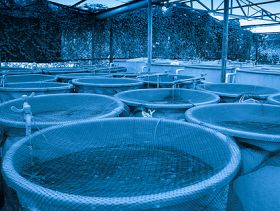 pany, Borneo Aqua Harvest, is confident that its strategies are in place and that there is an increased demand for aquaculture products despite recording a loss before taxation of RM3.272 million for financial year ended 2014 as compared to a loss before taxation of RM2.968 million for FY13.
pany, Borneo Aqua Harvest, is confident that its strategies are in place and that there is an increased demand for aquaculture products despite recording a loss before taxation of RM3.272 million for financial year ended 2014 as compared to a loss before taxation of RM2.968 million for FY13.According to Dr Kamal Bilal chairman of the Board of Borneo Aqua, the increase was mainly due to the reason stated above, coupled with additional cost of RM0.537 million for prospecting and exploration of minerals pursuant to the Co-operative Agreement signed with their business associate, as well as non-cash employee benefit cost of RM6.506 million arising from fair value accounting adopted for shares options granted to eligible employees and directors pursuant to an Employees’ Share Option Scheme (ESOS) implemented by the company.
However, he noted in the Annual Report 2014 that should the non-cash employee benefits cost of RM6.506 million and RM0.537 million for the prospecting and exploration cost incurred for mining for the financial year be excluded, the group would record a profit before taxation of RM3.771 million for the FY14.
Touching on updates on Borneo Aqua’s research and development (R&D), Dr Bilal highlighted that the group has always emphasised its R&D division to improve on its broodstock management by having a R&D team comprising experts from Japan, South Korea and Malaysia.
“The group not only purchase high value species broodstock from local market and other countries but also continuously conducts R&D for breeding new cross-breed marine fish species in order to be competitive in the market,” he pointed out.
In regards to Borneo Aqua’s current capacity and expansion plans, Dr Bilal shared that the group currently has about 4,239 tails of broodstocks of over 20 high value species.
In FY14, he noted that the R&D team has commended that all hybrid groupers are fast growing species especially when they reach the size of two kilogrammes (kg) and above, which is in line with the group recently adopted strategy to rear part of its culture groupers from two to six kgs and above before selling them, reports TheBorneoPost.
“The group is confident that with this strategy, it will be able to generate higher revenue for the group in the future,” he said.
Kamal added that the group will continue its construction of hatchery and nursery to cope with its increase in production which is in line with its expansion plan and also in line with the conditions of the Government grant.
Moving on to the trends in fish consumption and aqua-culture industry outlook, he highlighted that the world fish demand is estimated to increase in line with the growth of the population, income and standard of living.
Dr Bilal noted that the increase in demand is also due to greater awareness that fish is a good source of protein. He added that the importance of aquaculture grows each year because of increased demand for seafood, overall population growth and diminishing natural seafood supplies.
“Today, more than one million people rely on fish as a source of animal protein. In addition, 150 million people around the world depend on the fish industry for employment.
“Fish is also one of the highly traded aquaculture commodities with nearly 40 per cent of fish production traded internationally,” he observed.
Dr Bilal also pointed out that aquaculture has been proven to be efficient in increasing farmers’ income and improving food supply while protecting water resources and natural fishery resource.
He further noted that the United Nations Foods Agriculture Organisation (FAO) reports that international trade in fishery commodities has exceeded US$50 billion a year in recent years and is approaching $55 billion a year.
Overall, regarding Borneo Aqua’s market prospects, Dr Bilal shared that in South and Southeast Asia, the demand is expected to increase correspondingly to the rising population and income which will boost intra-regional trade, both for high-commercial valued and low-commercial valued fishery products.
“Currently, the Group is exporting its live marine fish by its own vessels to Hong Kong and Southern China.
“As the demand will continuously increase, the group will improve the marketing strategy and focus on the markets in Hong Kong and Southern China,” he concluded.





